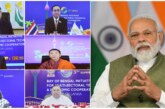Recently concluded Rio+20 Earth Summit, techiuncally known as the UN Conference on Sustainable Development, was held at Rio de Janeiro (Brazil) on 20-22 June 2012. It was perhaps the biggest summit the UN had ever organised. According to broad estimates, some 40,000 environmentalists and 10,000 government officials gathered with politicians from 190 nations for a meeting which the UN Secretary-General Ban Ki-moon said was “too important to fail”. The Rio+20 summit was so named because it took place 20 years after the landmark Rio de Janeiro Earth Summit of 1992.
The third and final meeting of the Preparatory Committee for the United Nations Conference on Sustainable Development (UNCSD, or Rio+20), Pre-Conference Informal Consultations Facilitated by the Host Country, and the UNCSD convened back-to-back in Rio de Janeiro, Brazil, from 13-22 June 2012. During their ten days in Rio, government delegations concluded the negotiations on the Rio outcome document, titled “The Future We Want.”
In closing the Conference, UNCSD President Dilma Rousseff (Brazil) stressed that Rio+20 was the most participatory conference in history and was a “global expression of democracy.” Taking place in parallel to the official events, approximately 3,000 unofficial events were organized throughout Rio de Janeiro.
Governments and the Rio Conventions organized Pavilions showcasing their experiences and best practices, and the Forum on Science, Technology and Innovation for Sustainable Development, a Global Town Hall, a People’s Summit, the World Congress on Justice, Governance and Law for Environmental Sustainability and spontaneous street actions were just a few of the many events around the historic city of Rio de Janeiro, discussing the Rio+20 themes and the broader requirements for sustainable development implementation.
The agreement adopted in Rio calls for the UN General Assembly (UNGA), at its next session, to take decisions on, inter alia: designating a body to operationalize the 10-year framework of programmes on sustainable consumption and production; determining the modalities for the third international conference on small island developing states, which is to convene in 2014; identifying the format and organizational aspects of the high-level forum, which is to replace the Commission on Sustainable Development; strengthening theUN Environment Programme (UNEP).
Besides, the UNGA is also called on to constituting a working group to develop global sustainable development goals (SDGs) to be agreed by UNGA; establishing an intergovernmental process under UNGA to prepare a report proposing options on an effective sustainable development financing strategy; and considering a set of recommendations from the Secretary- General for a facilitation mechanism that promotes the development, transfer and dissemination of clean and environmentally sound technologies.
In addition, the UNGA is called on to take a decision in two years on the development of an international instrument under the UN Convention on the Law of the Sea (UNCLOS) regarding marine biodiversity in areas beyond national jurisdiction. Furthermore, the UN Statistical Commission is called on to launch a programme of work on broader measures to complement gross domestic product, and the UN system is encouraged, as appropriate, to support industry, interested governments and relevant stakeholders in developing models for best practice and facilitate action for the integration of sustainability reporting. The text also includes text on trade-distorting subsidies, fisheries and fossil fuel subsidies.
THE FUTURE WE WANT
The outcome of the Conference, titled “The Future We Want” contains 283 paragraphs and is 53 pages long. It is organized into six sections: Our common vision; Renewing political commitment; Green economy in the context of sustainable development and poverty eradication; Institutional framework for sustainable development; Framework for action and follow-up; and Means of implementation. The following summary presents key points of debate for each section, followed by a summary of the adopted text.
OUR COMMON VISION
Section I having 13 paragraphs, inter alia includes: eradicating poverty and freeing humanity from poverty and hunger; CBDR; recognizing that poverty eradication, changing unsustainable and promoting sustainable patterns of consumption and production, and protecting and managing the natural resource base of economic and social development are the overarching objectives of and essential requirements for sustainable development. It also recognizes the importance of freedom, peace and security and respect for all human rights, including the right to development and to an adequate standard of living, including the right to food.
RENEWING POLITICAL COMMITMENT
Section II comprises three subsections, titled: Reaffirming the Rio Principles and past action plans; Advancing Integration, Implementation, and Coherence: Assessing the progress to date and the remaining gaps in the implementation of the outcomes of the major summits on sustainable development and addressing new and emerging challenges; and Engaging major groups and other stakeholders. These subsections include 42 paragraphs.
GREEN ECONOMY
This section affirms that there are different approaches, visions, models and tools available to each country to achieve sustainable development, and the green economy is considered one of the important tools, guided by the Rio Principles, Agenda 21, the JPOI and contributing to the MDGs. A paragraph on green economy policies addresses, inter alia: national sovereignty over natural resources; participation by all relevant stakeholders; sustained and inclusive growth; international cooperation on finance, among other matters; unwarranted conditionalities on ODA; trade discrimination; technology gaps; indigenous peoples and non-market approaches; poverty eradication; social protection floors; SCP; and overcoming poverty and inequality.
INSTITUTIONAL FRAMEWORK
Institutional framework envisaged under the final document refers to: Strengthening the three dimensions of sustainable development; strengthening intergovernmental arrangements for sustainable development; environmental pillar in the context of sustainable development; international financial institutions and UN Operational activities; and regional, national, sub-national, local.
Sustainable Development Goals
While reaffirming its firm commitment to the full and timely achievement of the MDGs, the document recognizes the importance and utility of a set of SDGs that are based on Agenda 21 and the JPOI, which, inter alia, fully respect all Rio Principles, and take into account different national circumstances, capacities and priorities. It further underscores what the SDGs should be, including addressing and being focused on priority areas for the achievement of sustainable development, being guided by the outcome document.
It further envisages the establishment of an inclusive and transparent intergovernmental process on SDGs, open to all stakeholders with a view to developing global SDGs to be agreed by the UNGA, and constituting an open working group comprising 30 representatives, nominated by member states no later than the opening of the 67th session of the UNGA.
This working group would decide on its method of work, including developing modalities, to ensure the full involvement of relevant stakeholders and expertise from civil society, the scientific community and the UN system in its work and would submit a report to the 68th session of the UNGA containing a proposal for SDGs for consideration and appropriate action.
It emphasizes on stating the need to: ensure coordination and coherence with the processes considering the post-2015 development agenda; provide initial input to the work of the working group by the UN Secretary-General in consultations with national governments and through an inter-agency technical support team and expert panels as needed; and report regularly on the progress of work to the UNGA.
It recognizes the need to assess progress towards the achievement of the goals, accompanied by targets and indicators while taking into account different national circumstances, capacities and levels of development. Besides, the relevant bodies of the UN system are called upon to support the regional economic commissions to collect and compile national inputs and on further committing to mobilize financial resources and capacity building, particularly for developing countries to achieve this endeavor.1
The Outcome
A salutary outcome of the Rio+20 Summit has been that the United Nations succeeded in obtaining pledges worth $513 billion from governments, private companies and multilateral agencies for projects aimed at reducing the strain on the planet’s resources. Sha Zukang, secretary-general of Rio+20, in his address to the media a few hours before the conference closed, said: “The 692 individual commitments from governments are for projects that cut fossil fuel use, boost renewable energy, conserve water and alleviate poverty.” 2
According to UN officials, the voluntary pledges are the most important legacy of the Rio+20 meeting, marking two decades since the first Earth Summit. They may accomplish more than the official agreement from the meeting, Sha said. “Highest expectations are on governments, but they cannot get the job done alone.”
In addition to these pledges, major development banks have committed $175 billion to the development of sustainable transport systems and private-sector companies have committed $50 billion to a UN-backed programme to provide energy to the world’s entire population by 2030.
India’s Stand
The Indian stance at Rio+20 has reportedly been lukewarm. India’s Minister for Environment and Forests Jayanti Nataraj told the media on 21 June: “We remain disappointed with the weak political will in developed countries to provide enhanced means of implementation to developing countries. We are glad that we have agreed to set up two important mechanisms, one for Technology Transfer and another for Finance. Both were Indian proposals.” 3
India’s Prime Minister, Dr Manmohan Singh, in his speech at the Rio+20 Summit on 22 June mandated the efficient use of available natural resources: “We have to be much more frugal in the way we use natural resources. A key area of focus is energy. We have to promote, universal access to energy, while, at the same time, promoting energy efficiency and a shift to cleaner energy sources by addressing various technological, financial and institutional constraints.”4
According to one opinion, in fact, both the Prime Minister and the Environment Minister have said that they are satisfied with the restoration of the centrality of the principles of common but differentiated goals in the outcome document, but as NGOs point out “Even as India justifiably asserts the principle of ‘common but differentiated responsibilities’ at Rio, and seeks preferential access to technologies and financial resources, you cannot ignore the fact that within our own country, the rich and powerful behave the same way towards the poor and the weak, as industrialised countries do towards ‘developing’ nations.”5
However, many civil society organizations, present at the summit, felt that India could have used the opportunity to show some leadership at the summit and even practice what it was trying to preach to other nations across the world.
In what may have major implications for India, the summit ended with a commitment that the developing countries needed additional resources for sustainable development and no extra conditions be imposed on them for financial aid from rich nations.
The Rio+20 document clarifies that the eradication of poverty is the top priority and shifting to green economy can’t put extra financial burden on the emerging and developing economies, a point pushed very hard by the Indian delegation here working closely with China and summit host Brazil.
Dr. R K Pachauri, chief of the Inter-parliamentary Panel on Climate Change hs opined that Rio+20 document is very balanced one and now the challenge is for governments, private sector and civil society to convert this draft into actionable policies.
The Rio+20 declaration reflects the concerns of countries like India as it clearly states that developing countries need additional resources for sustainable development and that “unwarranted conditionalities on Official Development Assistance (ODA) and finance should be avoided”.
Another important development that may have major impact for India’s right to food plans is the statement of UN secretary general BanKi-moon wherein he asked the world leaders, business and civil society to step up efforts to end hunger. The UN chief made this appeal while launching a Zero Hunger Challenge at Rio+20 on Friday. Saying that an estimated 1 billion people still go to bed hungry each day, Ban said food security was a top priority.
He further said: “We can’t rest while so many people are hungry in the world while there’s enough food for all,” said Ban. “Somehow this food is not distributed equally or fairly. Some people are living in prosperity while marginalised people are hungry. We know this has to change.”6
Conclusion
Undoubtedly, the Rio+20 Summit had heightened the expectations of the developing countries which it failed to deliver. It could be said to be a victory in principles and standstill in practice. However, one is inclined to agree with Simon Romero and John Broder of New York Times that even if the meeting laid out no enforceable goals or specific road maps, it perhaps signaled “a new assertiveness by developing nations in international forums and the growing capacity of grass-roots organizations and corporations to mold effective environmental action without the blessing of governments.”
According to Ms. Earle, the National Geographic explorer, the summit meeting had again put a spotlight, if only briefly, on environmental issues that have perhaps been overlooked, diminished or pushed aside due to the world economic malaise and calls for government austerity.
India should have played a more active role in this summit. India no more commands its clout in international fora be it either NAM, Group of 77 or General Assembly. India is losing its leadership edge and India’s present leadership seems perhaps happy with the situation and wants the status quo to be maintained.
Our politicians have a history of being followers rather than leaders in such matters. There is a need for bottom-up mass movement of individuals to get real progress on saving the planet.We should not forget Mahatma Gandhi’s solemn warning: “Earth provides enough to satisfy every man’s need but not every man’s greed.”
Notes
- These points of the report on “The Future We Want” are adapted from Earth Negotiations Bulletin, Vol. 27, No. 51, 25 June 2012, available at http://www.iisd.ca/download/pdf/enb2751e.pdf.
- Cited in Shobhan Saxena, “World adopts Rio+20 declaration”, Times of India, 23 June 2012.
- The Hindu, 22 June 2012.
- Cited in Ketaki Angre, “Rio+20 – the Indian Perspective”, ndtv.com, 23 June 2012, available at http://www.ndtv.com/article/india/blog-rio-20-the-indian-perspective-234912.
- Times of India, 23 June 2012.
By Dr. Arvind Kumar



